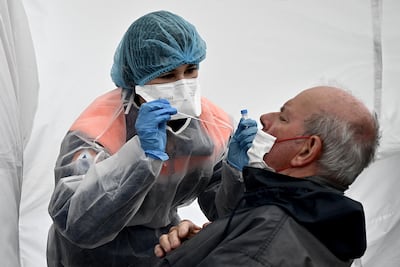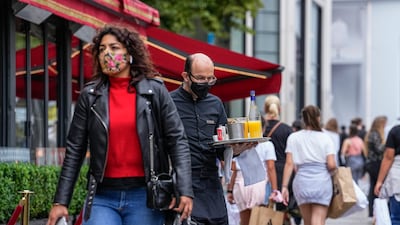European nations have pulled the handbrake on lifting Covid restrictions as the Delta variant spreads across the continent.
France, where the Delta variant now represents more than 60 per cent of new infections, reversed course on its reopening on Monday after the president announced new restrictions on those who are not vaccinated against coronavirus.
Emmanuel Macron, who went further than many had predicted, said that from August, anyone wanting to go out to eat or drink, visit a shopping centre, attend a festival, explore a museum or go to the theatre or cinema must show proof of vaccination or a negative test.
He also announced the Covid-19 vaccine would become mandatory for healthcare workers from September.
The diktat led to a record 926,000 people, most under 35, booking their vaccination appointment in a single day.
Other countries are also battening down the hatches in response to the highly contagious variant.
Dutch Prime Minister Mark Rutte apologised for hastily removing most restrictions after infections quadrupled in a single week.
The fast-spreading Delta variant has also driven an uplift in infection rates in Spain, Portugal and Cyprus. The strain is also dominant in Germany, Austria, Belgium and Denmark. In Italy, health officials believe the variant will account for most new cases in less than two weeks.
In Germany, Chancellor Angela Merkel on Tuesday made an urgent appeal for people to be vaccinated, linking higher immunisation rates with the further easing of pandemic restrictions.

The country has relaxed many restrictions on social gatherings in recent months, but people are still required to show negative test results or vaccine certificates to dine indoors and attend indoor events where capacity is limited. Masks are still required in stores.
In England, which is going ahead with a July 19 removal of remaining Covid-19 restrictions, Prime Minister Boris Johnson has changed his tone to urge caution despite earlier promising an “irreversible” reopening.
Mr Johnson's government — which claims that one of the world's fastest inoculation drives has largely broken the link between infections and serious illness — believes it is better to ease restrictions now rather than in the winter flu season.
Martin McKee, professor of European public health at the London School of Hygiene and Tropical Medicine, said England was an outlier in Europe where other major economies were tightening curbs in response to the highly contagious variant.
“England is embarking on an almost unprecedented experiment, relaxing restrictions at a time when infections are going up. The nearest recent example was the Netherlands, where the prime minister has apologised for a lack of judgment and relaxations have been reversed,” he told The National.
“The English decision is widely viewed as inexplicable in scientific terms.”
Prof McKee said Britain's divergent approach to other European countries appeared to be “driven by politics".
The UK recorded a further 36,000 new cases and 50 more deaths related to Covid on Tuesday.
“As a result, the message is now extremely confused. Essentially, people are told that they do not have to obey rules but ministers hope they will,” Prof McKee said.
“In much of the rest of Europe, governments are following well-tried epidemiological principles in the face of a new and much more transmissible variant.”
European Commission President Ursula von der Leyen announced on Tuesday more than half of all adults in the bloc were now fully vaccinated against Covid-19.
“To keep safe from variants and avoid a new wave of infections, it's important to get vaccinated,” she said on Twitter.
“Enough doses have been delivered to vaccinate 70 per cent of adults in the EU. Let's do it.”
France
France — which was one of the most vaccine-hesitant countries in the world before the pandemic — experienced a record day for vaccine bookings after Mr Macron announced new measures for those who are unvaccinated.
The prospect of having to take a test for every meal out appeared to have an instant effect on the unvaccinated.
More than 900,000 people booked appointments on Monday and the number continued to rise to as high as 1.3 million the morning after the announcement.
“We recorded 20,000 appointments per minute, an absolute record since the start of the campaign, and it's continued during the night and into this morning,” said Stanislas Niox-Chateau from Doctolib, one of the country's biggest websites to book vaccine appointments.
Mr Macron said the health pass would also be required to board long-distance trains and planes, giving a further incentive for people to be vaccinated as the summer holiday season begins.
“The virus is doubling every five days. We are talking about low figures which quickly become high,” he said.
“What we want is to avoid an epidemic wave and [get] protection for everyone. We're not taking this decision lightly.”

After falling from more than 42,000 per day in mid-April to fewer than 2,000 per day in late June, the average number of new infections per day in France has crept back up again, to about 4,000.
“Our country is facing a surge in the epidemic across our territory, in mainland France as well as overseas,” Mr Macron said.
But Roland Heguy, head of the Union of Hospitality Trades and Industries, said the new measures would take a “sledgehammer” to the industry.
“The season was shaping up very well and there we have this brake coming,” he said.
The Louvre Museum in Paris said they would devise new safety policies after Mr Macron's announcement, but added: “We are still awaiting clear instructions from the Ministry of Culture.”
Spain
Spain has also had to reverse course in the lifting of restrictions.
On Monday, officials said the country’s two-week Covid-19 contagion rate was still rising, more than tripling in two weeks
New restrictions were announced in Catalonia and Valencia last week, including the closure of most night-time venues, as well as limits on social gatherings.
In Valencia, the regional government asked its court to authorise a curfew on towns with more than 5,000 people that are considered high risk.
Portugal
Portugal is scrambling to bring under control a worrying surge in infections, imposing stricter rules last week to tackle the latest jump in cases
Holidaymakers are required to show a negative test, vaccination certificate or proof of recovery from Covid-19 to stay in hotels.
A night-time curfew is also in place in 50 municipalities.
Cases started to gradually increase after Portugal opened to visitors from the EU and Britain in mid-May.
But daily deaths remain well below February levels, with new cases primarily reported among younger, unvaccinated people who are less likely to fall seriously ill.
Data released on Tuesday showed all Covid-19 cases in the Lisbon area and the popular southern Algarve region are of the Delta variant.
Germany
Germany's disease control agency has said the country should aim to vaccinate 85 per cent of people aged 12 to 59 and 90 per cent of people over 60 to prevent the Delta variant from causing a resurgence of coronavirus cases in winter.
German Chancellor Angela Merkel, who has received both shots, urged people to be vaccinated but said she would not be enforcing mandatory vaccinations after France tightened curbs on unvaccinated people.
“The more people are vaccinated, the more free we will be again, the more freely we will be able to live again,” she said.
“I’m not ruling out that this might be talked about differently in a few months, either. But at the moment we have said we don’t want compulsory vaccinations; we want to promote vaccinations.”
About 58.7 per cent of the German population has received at least one shot and 43 per cent are fully vaccinated.
The number of confirmed coronavirus cases in Germany increased by 646 on Tuesday, with a further 26 deaths reported.
Netherlands
The government last Friday reimposed curbs on bars, restaurants and nightclubs in an effort to stop a spate of infections among young adults two weeks after most lockdown measures were lifted as cases were falling.
All multi-day festivals and events with large crowds have also been cancelled until August 14.
On Saturday, the country’s public health institute reported more than 10,000 new Covid-19 cases, the highest number of positive tests since late December.
“An error of judgment was made. We are sorry about that,” Prime Minister Mark Rutte said.
More than 46 per cent of the Netherlands’ adult population is fully vaccinated and more than 77 per cent of adults have had at least one shot.
Italy
Italy is currently experiencing a rise in Covid-19 cases after 15 weeks of falling infections.
Pierpaolo Sileri, the deputy health minister, told Radio 24 that the Delta variant was expected to become dominant in less than two weeks.
“It’s great to see people in the squares, but we will inevitably see the number of infections rise. The Delta variant will spread and become dominant sooner than expected,” he said.
“I fear by the end of the month [there will be] three to four times the infections that we have today.”
Several regions were at risk of losing their low-risk Covid status and were expected to be placed under tougher restrictions.
Cyprus
In Cyprus, the 14-day case notification rate per 100,000 people is at almost 500, higher than Britain, according to the European Centre for Disease Prevention and Control.










